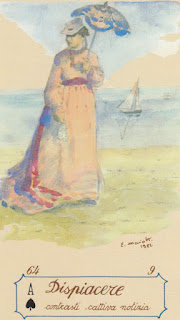We were so far back in the woods, they almost had to pipe in sunlight.
~ Roy Rogers
The tangled vegetation with only the barest hint of light makes the observer of this card feel lost in the deep woods. Being lost in an unknown forest with the threat of wildlife, weather or obstacles to stumble over is a good analogy for how life feels when we are overwhelmed and can't see a path out. Yet Bodhipaksa reminds us: "Once we know, understand, and accept that life is difficult, it becomes less difficult. This difficult thing of being human is made easier when we accept the inevitability of suffering." This dark place isn't abnormal; others have been disillusioned, overwrought and felt hopeless. The Ogham tile represents simple lettering, thus its meaning deals with communication. It reminds us that those who have been lost and found can help those of us who are still floundering blindly through the woods. But finding our way will require that we reach out, knowing that asking for guidance is also a tool of self-reliance.



















































